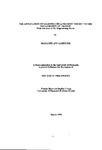THE APPLICATION OF LEARNING ORGANISATION THEORY TO THE MANAGEMENT OF CHANGE With reference to the Engineering Sector
| dc.contributor.author | GARDINER, PENELOPE ANN | |
| dc.contributor.other | Plymouth Business School | en_US |
| dc.date.accessioned | 2013-11-06T13:09:57Z | |
| dc.date.available | 2013-11-06T13:09:57Z | |
| dc.date.issued | 1998 | |
| dc.identifier | NOT AVAILABLE | en_US |
| dc.identifier.uri | http://hdl.handle.net/10026.1/2639 | |
| dc.description.abstract |
Recent contributions to the literature on organisations have emphasised the need for constant adaptation to keep pace with the accelerating rate of environmental change. The learning organisation is proposed as one of the most effective means of achieving succesful adaptation through a central focus on learning. This thesis examines the development of the .ideas which have led to the concept of the learning organisation and the application of this concept to the management of change. A number of reasons are proposed for the current adoption of learning organisation theory, these include the restructuring and downsizing of organisations, new Human Resource Management practices, improved understanding of learning and systems thinking. Organisational change is examined in relation to learning and a number of models of change management are considered. Different approaches to the evaluation of change are also discussed and some examples outlined. Some of the elements which comprise a learning organisation are described and the relationships between these indicated. The project aimed to apply learning organisation theory to the management of change by studying firms which were intending to become learning organisations. A generic model was constructed and used to form the basis of a specially designed diagnostic instrument for the measurement of learning organisation characteristics. This took the form of a questionnaire called the Learning Organisation Research Inventory (LORI). Data were collected from two large organisations in the engineering sector via administration of the questionnaire and interviews with employees. Analysis of the quantitative data was based on nine conceptual categories derived from the literature. Factor analysis was carried out on the second data set but this failed to provide a satisfactory classification. It was proposed that further factor analysis be conducted on a larger sample. The results of the study indicated that the generic model was probably inappropriate; there were factors specific to the engineering sector and to these particular companies which probably influenced the success of learning initiatives and indicated the need for a sector-specific model. Neither organisation could be said to be a learning organisation and it did not prove possible to identify the components of such organisations. However, the lack of certain characteristics in these organisations appeared to have acted as barriers to learning. It was proposed that a learning orientation might be a more useful perspective than a learning organisation and may perhaps be easier to achieve. A new model of a learning orientation was developed from the research; it is suggested that, subject to further testing, this might form the basis for future studies of this type. | en_US |
| dc.language.iso | en | en_US |
| dc.publisher | University of Plymouth | en_US |
| dc.title | THE APPLICATION OF LEARNING ORGANISATION THEORY TO THE MANAGEMENT OF CHANGE With reference to the Engineering Sector | en_US |
| dc.type | Thesis | |
| plymouth.version | Full version: final and full version as approved by the examiners at the time of the award of your degree | en_US |
| dc.identifier.doi | http://dx.doi.org/10.24382/3881 | |
| dc.identifier.doi | http://dx.doi.org/10.24382/3881 |
Files in this item
This item appears in the following Collection(s)
-
01 Research Theses Main Collection
Research Theses Main


